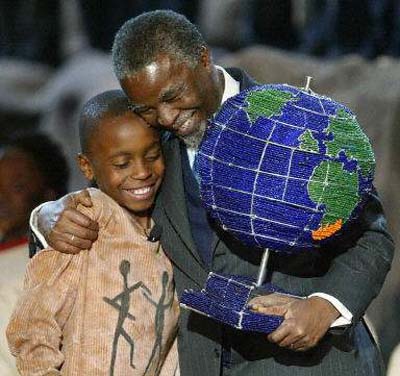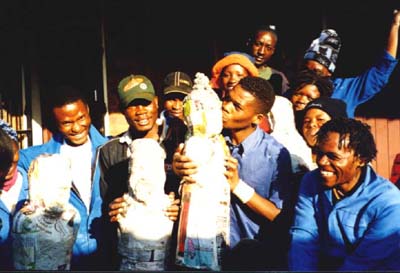| Republican News · Thursday 29 August 2002 ![[An Phoblacht]](http://republican-news.org/graphics/title_gifs/aprn.gif)
Earth 2002: Where profit comes before people
The World Summit on Sustainable Development

South African President Thabo Mbeki officially opened the Earth Summit
|
| |
Westerners now live on average over 30 years longer than Africans
|
There is something unhealthy about media and western governments repeating the mantra that this World Summit on Sustainable Development, organised by the United Nations and taking place in South Africa, is exclusively for developing countries.
In any case, they explain, our governments' delegates are there to "help" developing countries to choose what is better for them and what is cheaper for us. They all forget to mention that their policies are very much responsible for the situation that developing countries are suffering today.
All issues being discussed in Johannesburg affect us, citizens of the rich countries, directly. Think of Global Warming and you will find the cause behind recent floods in Europe or the year 2000 floods in Mozambique. Mozambique is a poor country, with little or no industry. However, it has to suffer the floods caused by carbon dioxide produced in Europe and North America.
If nothing is done to remedy it, these once rare climatic occurrences may well become the norm. Deserts are also spreading, thanks to the Greenhouse effect created by our pollution, helped along by soil exhausting farming methods, overgrazing and deforestation. At least 32 African countries have signed the Desertification Convention, but so also have Spain and Italy, as the fear that the Sahara is crossing the Mediterranean is slowly becoming reality.
On Sunday 25 August, South African president Thabo Mbeki welcomed delegates to the World Summit on Sustainable Development with a call to action to band together to save the global environment and combat poverty. This call though, may very well be ignored, as sustainable development is not in the interest of those who can make a difference in our world of destruction, injustice and inequality.
At the beginning of the 21st century, the Earth is no longer a home for humankind, but a producer of resources and raw materials. So corporations' interests - and not people's - are represented at this summit.
Back in the 1980s, the international powers already knew that for developing countries, the situation could only worsen. This was a strange time, when our environment awareness was raised and we took on worthy causes like the Rainforest while ignoring the human component behind them. Remember Chico Mendes, the murdered Brazilian environmentalist who managed to rally enough international support to stop the construction of a road through the Rainforest? All very well, but he was not an environmentalist as such, nor was the Rainforest his main concern. Mendes was fighting for the rights of the rubber collectors, as their rubber trees were being threatened by the road. But he had to wear a Save the Rainforest t-shirt to save his village and the jobs of his inhabitants. Later, he paid for his audacity with his life.
By the 1990s, some of the closer relationships between the environment and human survival were better understood. However, as neoliberalism - which is just an extreme form of capitalism - started developing, activism became history. As anti-globalisation writer George Monbiot outlines in an article published by The Guardian, "our greatest failure was that we permitted green consumerism to begin to take the place of green citizenship: many people chose to believe the seductive notion that we could buy our way out of trouble". And so, we, the citizens, delegated our responsibility to save the earth onto our governments.
The Earth Summit in Rio do Janeiro (1992) was doomed from the start. Corporations have already briefed governments. US delegates, with George Bush Senior leading them, managed to block any attempt towards meaningful progress. Some measures were agreed, and the richest countries committed themselves to contribute $7 billion a year, which represented only 1% of the total cost of practices imposed on developing countries.
From then on, failure to tackle social and economic inequality and environment destruction were a mark of the decade. Carbon Dioxide emissions have risen by nearly 10% since the Rio meeting. The signing of the Kyoto protocol in 1997 did not produce any real change in global warming, as the main producer of greenhouse gases, the US, with 25% of the worldwide total, decided to pull out. The oil companies that funded George Bush Junior's campaign had called payback time.
At Johannesburg, corporations have decided to represent themselves at the summit. Some of the British delegates are company directors Bill Alexander - chief executive of Thames Water; Sir Robert Wilson - executive chairman of Rio Tinto; and Chris Fay - non-executive director of Anglo American. A quick glance at the recent histories of these companies shows their professed commitment to sustainable development to be rather spurious.
Thames Water ranks third in the water industry worldwide as part of the huge, state-sponsored, German utilities conglomerate RWE. In Britain, Thames Water has been prosecuted by the Environment Agency for pollution on more than 20 occasions since 1996. The company appeared in court five times for six offences during 2000, and was fined a total of £288,000. The company was also fined £12,000 earlier this year, after it admitted polluting tributaries in Gloucestershire. In the developing world, it has been criticised for charging excessively high prices for water and for exploiting this vital resource. In addition, the company has faced heavy criticism for operating in Indonesia during the Suharto dictatorship.
Rio Tinto is the largest mining company in the world and has an appalling record of environmental and human rights violations at its mines and smelters. It is one of the companies that stands accused of 'blue-washing' its image by signing the UN's Global Compact. The Compact requires companies to agree to a set of nine principles that relate to environmental concerns and human rights. The Compact has been widely criticised for being completely unmonitored. This has allowed companies to cloak themselves in the respectability of the UN flag, whilst blatantly ignoring the principles they have agreed to. Since signing the Compact in 2000, Rio Tinto has regularly flouted Global Compact principles, while continuing to pay lip-service to environmental and social concerns.
The mining giant Anglo American has made a substantial financial contribution to the World Summit on Sustainable Development (WSSD) and claims to take its environmental performance 'extremely seriously'. Pretty rich from a company with a long history of exploitation of African labour, that has recently faced criticism regarding its planned operations in Peru and alleged pollution in Zambia. The company, which was a pillar of apartheid South Africa, has left behind a legacy of billions of dollars of damage to the environment and to communities around Johannesburg itself, the site of the WSSD. Tony Blair will briefly attend the summit. George W Bush has already announced that it will not be part of his agenda.
| |
Huge subsidies to farmers in the West have a catastrophic effect on developing countries
|
Some of the issues
POVERTY
FACTS
The average European cow is subsidised to the tune of $2.20 a day by taxpayers, while 2.8 million people in developing countries live on less than $2 a day.
The richest 25 US citizens have an income equal to that of almost 2 billion people.
Living standards in Sierra Leone are equivalent to those in the West 600 years ago.
The world's richest country, Switzerland, enjoys per capita income nearly 80 times higher than south Asia, the world's poorest region.
Poverty, forced migration and the West's closing of its doors to migrants has led to a booming trade in people trafficking, which is today more lucrative than drugs smuggling.
At the UN Millennium Summit, world leaders committed themselves to halve global poverty by 2015. The targets - to eradicate hunger, reduce under-five mortality by two-thirds and get every child of primary school age into the classroom - will cost between $40 billion and $60 billion on top of current aid spending (only a sixth of what the West spends on subsidising farmers). In the most recent assessment of progress, the UN said that a quarter of the world's total population would miss the target. If the improvement of living standards continues to rise at the current speed, it will take 130 years for world hunger to disappear.
The International Monetary Fund argues that the Open Market economy is the solution to poverty. However, this policy only works in one direction. Developing countries are the open markets, while Western economies routinely protect their markets against products from Africa, Central or South American and Asia.
d for some, poverty is money. More and more corporations are contracting labour from factories in developing countries. Far from improving these countries' situations, they cause irreparable damage to the social fabric, diminishing the political, social and economic rights of workers.
Charles Kernaghan, executive director of the National Labour Committee - an independent, US-based non-profit organisation focused on the protection of workers' rights - uses the example of Indonesian workers involved in the making of Nike shoes to illustrate the effects of corporate activity in developing countries. "In 1991, they were paid $0.45 per day, not enough to meet basic physical needs. Today, their inflation-adjusted wages are little better. Nike, on the other hand, has tripled its annual revenues over the past ten years from over $3 billion in 1991 to $9 billion in 2000. Human rights observers have noted the presence of army units inside some of the factories where Nike shoes are made."

Greenpeace's Filthy Three monster depicts the main obstructors to Earth Summit progress: George Bush (USA), John Howard (Australia) and Jean Cretien (Canada).
|
WATER
FACTS
1.2 billion people lack access to clean water
2.4 billion people have no sanitation
Up to 3 million people die each year of easily preventable water-borne diseases.
70% of the world's fresh water is used to grow food. Population increases in the next 20 years will mean that agriculture alone will need at least 17% more water to grow the necessary extra food.
Most of the world will not have enough water within 30 years.
Twenty-six countries suffered water scarcity in 1990; this is expected to rise to 65 countries in 20 years' time.
The wars of this century will be over water. This precious resource is already causing tensions between and in countries, as some governments favour hydroelectricity production over agricultural and human water consumption. Huge dam projects are developing all over the world, but mostly are being planted in developing countries and funded by Western interests. One example is the construction of the Ilisu dam in Kurdish territory under Turkish control. This dam will flood Kurdish historical sites and reduce the flow of water into neighbouring countries (Iraq, Syria). This artificial intervention will interrupt the natural water cycle, so in the future less rain can be expected, adding a new element to water shortage.
There is plenty of water globally. However, the problem is that in some cases it is inaccessible and when it is accessible, it has been heavily polluted. Underground water supplies are dropping alarmingly, in many cases having been pumped up for industrial use. Water tables in China are dropping by almost 1.5 metres a year. In areas of India, they have dropped 30 metres in 30 years. In Bangladesh, 15 million people are being slowly poisoned, as the well water they drink is laced with arsenic.
While governments have been slow in coming to terms with the water crisis, the private sector has identified water as another resource to be exploited for profit. Corporations' new goal is to make water a private commodity, and governments around the world are helping by selling public water services and supplies to private companies.
HEALTH
FACTS
Of the 3 million deaths worldwide caused by AIDS, 2.3 million occur in Africa
Of the 1.5 million deaths worldwide due to Malaria, 960,000 occur in Africa
Of the 2 million deaths worldwide caused by TB, 1.5 million occur in Africa
* The turnovers of pharmaceutical companies like GlaxoSmithKlein ($29.8 billion), Bristol-Myers Squibb ($19.4 billion), and Roche ($15.6 billion) are larger than the gross national incomes of countries that buy their products, like Kenya ($10.7 billion) or Zimbabwe ($6.3 billion).
Between 1975 and 1999, out of 1,393 new medicines brought to market, only 16 were for tropical diseases and TB.
Pharmaceutical companies are driven by profit.
In some areas of Southern Africa, life expectancy has dropped to 20 years. Grandmothers are looking after babies. A whole generation has disappeared, and it seems to be only the beginning. AIDS has become the main worry in Sub-Saharan Africa. Malaria and TB are present only in the developing world, so naturally, new drugs are not available as there is no affluent market for them. An example is the case of the sleeping sickness, which killed 66,000 people in 1999 and threatens 60 million.
A pharmaceutical company found a drug that worked on the final stages of the disease. But in 1995, after only five years of production, its commercialisation was stopped because African countries could not afford it - a variant formula is still being used in the US as hair remover. Aventis, the company that held the licence in 1998, passed it on to the World Health Organisation, which is trying to secure the drug's production.
HIV/AIDS is an incurable disease that affects 900,000 people in the US and nearly 35,000 in Britain. Pharmaceutical companies continue to invest in new drugs and work to find a vaccine to save the affluent. At the moment, the anti-retroviral drugs allow HIV carriers to live with the virus. However, in Africa, the virus kills. It is not that the governments in developing countries do not know about the medicines; it is that even after price reductions were agreed, most of them cannot afford them.
There is money available to help developing countries to access drugs: the Global Fund for HIV/AIDS, TB and Malaria. However, it failed to raise the expected $7 billion from donors, and in its first year received only $2.8 billion (only $500,000 from the US).
HUNGER
FACTS
18,000 children and 6,000 adults die as a consequence of hunger every day.
More than 800 million people are malnourished.
180 million children are severely underweight for their age.
2 billion people suffer from nutrient deficiency diseases.
There is plenty of food around, but people are still dying of hunger. The globalisation of agriculture has failed to address or solve the Earth's hunger crisis. For the last two decades, the total amount of food in the world has increased, but so has hunger.
New production methods are pushing small, self-reliant farmers off their lands and replacing them with large and intensive farming plantations. The product is routinely not for the consumption of the local population but a cash crop for export. And decisions on what should be grown on the land follow the rule of markets thousands of miles away from the producers.
Now, global biotechnology companies claim they have the answer to world hunger: GM crops. But once again the hunger that they look to placate is their own greed, as GM produces sterile seeds, forcing farmers to spend part of their meagre income in buying new seeds every year.
But even in the land of plenty there is need. The US exports 60% of its food production every year, while 26 million of its citizens depend on food handouts. Indian grain production has increased and the surplus has reached 59 million tonnes, but millions of Indian children are malnourished.
When the West speaks about development, it usually refers to its own. Europe and US farming subsidies reach around $350 billion a year. This money allows Western agricultural surpluses to inundate developing countries' markets with cheap product, depressing world prices and making local farming unprofitable.
Ghana used to export rice. Today, this export has collapsed due to the pressure from cheaper US and Thai imports. In Pakistan, desperation is driving farmers to burn their harvests. Around 20% of Africa's food now comes from rich countries, though it could be easily produced there.
The International Monetary Fund supports this policy, though even the World Bank has recognised that the globalisation of agriculture has left the poorest worse off than before, driving farmers from rural areas to poverty belts around the cities.

Friends of the Earth papier maché figures are produced in South Africa's townships. The figures stand for all the voices not heard at the summit and their sale provides a source of income for impoverished families
|
Contents Page for this Issue
Reply to: Republican News |